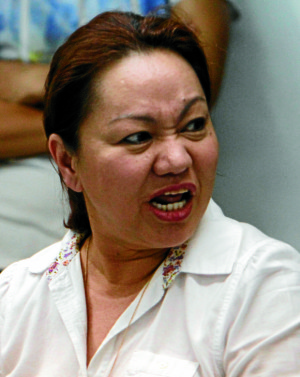After winning the support of the Duterte administration, businesswoman Janet Lim-Napoles has lost in one of her attempts to clear her name in the country’s biggest corruption scandal.
The Supreme Court on Tuesday upheld the indictment of Napoles and two of her coaccused for graft and malversation of public funds in one of the cases filed by the Office of the Ombudsman regarding the P10-billion pork barrel scam.
The case was in connection with the alleged misuse of P27.5 million from the Priority Development Assistance Fund (PDAF), the official name of pork barrel, of then Agusan del Sur Rep. Rodolfo Plaza from 2004 to 2010.
Napoles, regarded as the architect of the PDAF scam, has found an unlikely ally in Solicitor General Jose Calida, who filed a manifestation in the Court of Appeals supporting the appeal of her 2015 conviction for unlawfully detaining whistle-blower Benhur Luy.
Bogus foundations
Luy, who worked as Napoles’ financial officer, divulged the intricate web of irregularities which Napoles purportedly used to siphon off billions of pesos in congressional pork barrel allocations to her network of bogus foundations.
“The court upheld the Ombudsman’s determination of probable cause and reiterated its deference to the Ombudsman performance of said duty,” Theodore Te, Supreme Court spokesperson, told a press conference.
Te said the 15-member tribunal ruled that Ombudsman Conchita Carpio Morales did not commit grave abuse of discretion when she approved the filing of criminal charges in the Sandiganbayan against Napoles, her driver John Raymund de Asis and sacked National Agribusiness Corp. president Alan Javellana.
In throwing out their petition for certiorari, the Supreme Court said Napoles and De Asis erred in claiming that they should not be charged with violation of Republic Act No. 3019, or the Anti-Graft and Corrupt Practices Act, since they were not government officials.
“(T)he petitioners’ contentions that the absence of the elements of the crimes they were charged with is a matter of defense to be ventilated at the trial, as these are evidentiary matters requiring a full-blown hearing and not during the preliminary investigation,” the tribunal ruled.
Te added: “The court pointed to the policy of the state … to repress acts of public officers and private individuals that constitute graft and corruption or may lead thereto.”
The Supreme Court declared the PDAF, which funded pet projects of lawmakers, unconstitutional in 2013.
